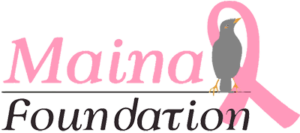
NEWSLETTER
May 2023
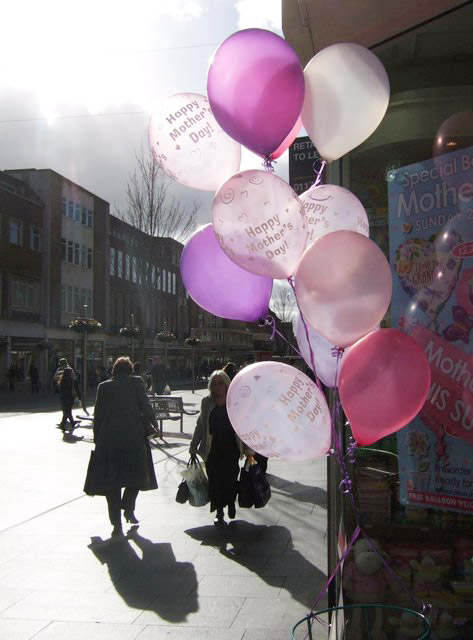
Welcome to the Maina Foundation Newsletter!
Inspiring Interview with Breast Cancer Survivor
Lakshmi Vellala
By Manju Soni
Hi Friends,
It’s May! The time when the sun starts to shine brighter, the days are longer and the air is as crips and fresh as the sea breeze on a calm day. It’s also the month we REMEMBER AND CELEBRATE MOTHERS!
And here, at Maina Foundation our mission is to ensure no one loses their mother to breast cancer.
This month we have an inspiring mother who tells us about what helped her get through her breast cancer journey.
But first, I think you’ll enjoy this soulful song, it’s simply called MOTHER, by the band SUGARLAND.
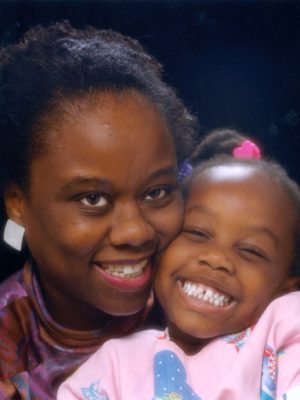
Here are the lyrics of the first verse and chorus, and the link to the YouTube video. Enjoy.
[Verse 1]
She’ll take you in, feed your friends
Her open arms are welcoming
She’ll rub your back all night when you’re crying
She’ll listen to you tell your story
Hold your fear and all your worries
Help you find the truth when they’re all lying
Even when it’s hopeless, she keeps trying
[Chorus]
She’s your mother, you love her
There won’t be another place like her again that you call home
She stands here to help you, there’s nothing she won’t do
As long as she’s alive, you’re not alone, you’ve got each other
That’s your mother
Inspiring Interview with Breast Cancer Survivor Lakshmi Vellala
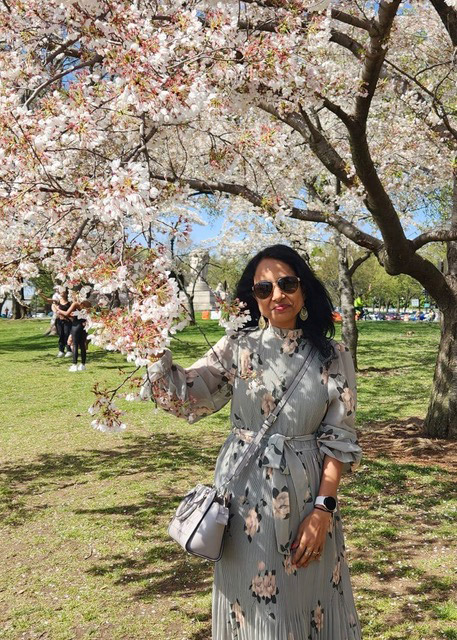
If breast cancer survivor Lakshmi Vellala could give others any advice, it would be for them to be vigilant about their health, to not delay seeking help, and to be their strongest advocate.
When did your health issues first start?
My health journey began in 2012 when, in my mid-30s, I felt a small lump in my right breast. In spite of being terrified of needles, I sought help, and after multiple tests was told the lump was non-cancerous. I was offered the choice of having it removed, or not. I opted to not have it removed, and was called back for an annual mammogram to pick up any growth or changes in the lump, which eventually disappeared spontaneously.
In 2016, I felt another small lump in the same breast. I went for a mammogram and was asked to return for a repeat mammogram. I was stunned when the second mammogram pointed to calcification in the left breast (the one opposite to where the lump I felt was). Doctors were concerned I had Ductal Carcinoma in Situ.
When I was called back for the calcification on my left breast, I mentioned the lump I had noticed on my right. They did 3d pictures of both breasts then.
With no family history of breast cancer and at such a young age, I was shocked to find out, after multiple tests that included 3D imaging, ultrasounds and bilateral biopsies, that the calcification in my left breast was non-cancerous, but the lump in my right breast, that I had picked up, was indeed cancerous.
I have two daughters, and at that time my older daughter was in middle school, and my younger was in elementary school. All I wanted to do was be there for them when they graduated to high school and middle school respectively. It broke my heart when my youngest began to cry when we told them I had cancer. She said she didn’t want anything to happen to me. I was also relieved genetic testing came back negative for the BRCA genes.
None of the tests had found positive lymph nodes, but during surgery, the dye test found two positive nodes, and to be on the safe side the surgeons removed 16 nodes in total.
After consulting all the doctors in my family, my dad and brother, as well as my sister-in-law, and two uncles, are all doctors, I opted to have a mastectomy on the right breast.
Surprisingly, many of the tests were inaccurate in my case. Firstly, the screening mammogram missed the lump, secondly, during surgery the tumor that was thought to be small initially, turned out to be much larger than expected, and thirdly, the lymph node spread was only detected on the surgical table, which led to half my axillary lymph nodes being removed.
The surgery was followed by chemo- and radiation therapy, all of which lasted for nine months.
What helped you get through these difficult months?
I was terrified of the surgery. My main concern was for my daughters should something happen to me on the operating table. Once the surgery was over, I found the chemo and radiation more manageable.
I am very grateful to God for my wonderful husband who not only accompanied me to my hospital appointments, but took over everything related to the girls and their school and extracurricular activities. My mom, and later my mother-in-law, came from India to help me through the chemotherapy. And I’m very grateful to my aunts who came from Los Angeles and Arkansas to help, both during and after my surgery.
I’ve never seen my mom so strong, and she gave me strength too. When I lost my hair she said, “It’s okay, you’ll be fine. Your hair will grow back.” We went wig shopping at a specialty shop that also sold scarves and hats of which I bought quite a few. Both my mom and my mother-in-law were an amazing moral support for my husband and girls too.
My friends were lovely, they would take me out to distract me from my health issues.
The first few chemotherapy sessions took a toll on my energy. I’d have my treatment on a Wednesday and only recover a week later, by which time my next dose was due. But later chemo sessions were less draining, I’d be down for about two days, leaving me with enough strength to cook for my daughters. That was important to me because I wanted to feel like I was still doing something for them. I often joked with them about my hair loss so it didn’t make them feel awkward around me.
When I was too tired to do anything, I would watch Telegu classic movies with my mom.
How did your daughters manage during your illness?
My older daughter immersed herself in her school work and studies, my younger would occasionally cry and we’d snuggle in front of the TV while watching the movies with my mom.
They grew up quickly during that time, and they were very helpful to their grannies and their father, especially with the laundry and cooking.
And, they have a lot of respect and love for the courage I showed during that time. I had one mission and one mission alone during those months. And that was to get better so I could be their mom again. When you think of your kids you can weather so much, you become the strongest person in the world.
What did you do to regain your strength?
I was lucky to have an aunt who is a breast cancer oncologist. She recommended a list of foods to eat and a list to avoid. I ate lots of lentils and fresh cooked vegetable, including spinach, beetroot, carrots, and also paneer, yogurt and milk as well some Indian foods like idli and dosa. I avoided takeout foods and raw foods because my aunt said raw foods may be contaminated and with my lowered immune system, I couldn’t afford to get a food-borne infection.
Did you work during your treatment?
Initially I took short-term disability leave but eventually went back to work during my radiation treatment. I’d leave work for an hour every day to have my radiation, and then return to work, only to collapse into my bed as soon as I got back home.
Where are you now in your journey?
I’ve been 5.5 years cancer free and have seen both my daughters graduate more than once. My older daughter is a sophomore in college and my younger is a junior in high school.
When I was undergoing surgery, my doctors said I should keep an eye on my weight, and if I began to gain weight, I should have my thyroid function checked. The radiation can result in damage to the thyroid gland. And once again, I became my own health advocate. When my weight began to creep up, I asked the doctors to do my thyroid tests, and lo and behold it indicated hypothyroidism, for which I take medication.
I have mild lymphedema on my right arm around my elbow, but it’s manageable.
I still have my routine mammograms and see my oncologist every six months, and my gynecologist as well.
And I still self-examine, and have follow up mammograms.
How do you help other breast cancer survivors?
I volunteer for an organization called Breast Cancer Hub started by a friend, Dr. Lopa. The organization aims to raise awareness of early detection and screening, to break the taboo around breast and gynecological cancers and provides a support group for survivors.
I’m familiar with the fear and hopelessness that can overwhelm you when you’re first diagnosed. I volunteer to speak to people going through their treatment process, mainly to let them know it’s not the end of the world, that there is a light at the end of the tunnel, I’m living proof of that. I hope to give them strength and leave them with a positive energy.
And what’s heartening is my older daughter has also volunteered for Breast Cancer Hub.
Any last words for our readers?
You need to be vigilant and proactive in all things related to your health. The patient is the best advocate for themselves, and don’t be concerned that you’re unnecessarily bothering your doctor. Don’t delay, even in small matters that may seem insignificant.
Thank you, Lakshmi, for your valuable time and for all that you do for fellow breast cancer patients!
Remember, regular screenings are still crucial for early diagnosis.
Thank you for reading!
Manju Soni (she/her) (pen name: M. J. Soni) is a former eye surgeon turned author. She is the author of Defying Apartheid, her debut nonfiction book that captures her experiences of being a young activist against apartheid. Her short fiction and essays has appeared in Ellery Queen Mystery Magazine, Akashic Books, Apeiron Review and The Establishment. She’s a member of Crime Writers of Color and Sisters in Crime (National and Connecticut).
https://manjusoni.com | https://twitter.com/MJSoniWrites
News!
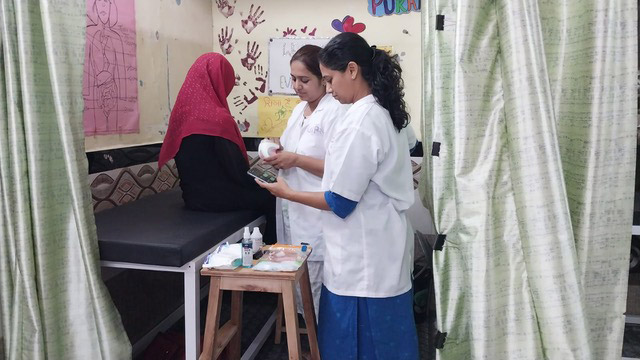
In some exciting news, PUKAR an organization in Maharashtra India, recently held a screening program for the coastal villages of Maharashtra. This was a collaborative effort in which Maina Foundation loaned PUKAR the iBreastExam unit. PUKAR then conducted a very successful campaign during which they screened a total of 1050 women out of which, 57 women had positive reports on iBreast. They have all been referred to Sion Hospital where their mammograms and sono-mammograms will be performed.
Their next step is to take this process to another informal settlement community of Kauala Bandar on the Eastern water front.
Your support in our efforts would be enormously appreciated!
We thank you for your continued support!
For more information on Maina Foundation, and to help its mission, go to https://mainafoundation.org or contact us at 860-434-3985 or info@mainafoundation.org
SAVE A LIFE - DONATE NOW
Donations can also be mailed to:
8 Peppermint Ridge, Old Lyme, CT 06371, USA
